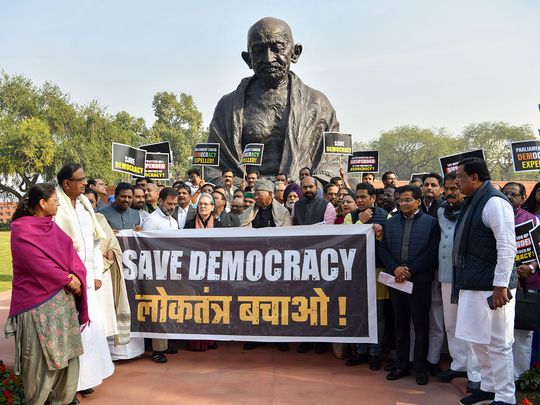
In last week’s “Right Turn”, I analysed the security breach in India’s new parliament building on December 13. Two young men, with passes to the Visitors’ Gallery, had jumped into the chambers below.
They released smoke bombs from canisters hidden in their footwear, with one of them leaping from bench to bench until he was apprehended. All of this was caught on camera and broadcast nationally and internationally, both on mainstream and social media.
The culprits, in what appears to be a well-orchestrated plot, have been apprehended. While all the facts are not known, and a high-level inquiry is still ongoing, it seems likely that the attack was carried out by disgruntled youth rather than terrorists.
Unruly and unparliamentary conduct
Yet, the seriousness of the security breach has been widely acknowledged, not only by the Speaker of the Lok Sabha, Om Birla, or the Chair of the Rajya Sabha, Jagdeep Dhankhar (the Vice-President of India), or the Parliamentary Affairs Minister, Pralhad Joshi.
In fact, both Prime Minister Narendra Modi and Home Minister Amit Shah, speaking separately to the press, have stressed the gravity of the security breach. As Modi admitted to a newspaper, “what happened is very serious.”
However, according to members of the opposition, neither the PM nor the Home Minister have made a statement, as was their insistent demand, on the floor of the parliament.
In the ensuing protests, some of which have descended into unruly and unparliamentary conduct, as many as 141 opposition MPs have been suspended. This is by far a record for the Indian parliament where mass suspension of misbehaving MPs has been seen before but never on this scale.
Out of 543 members of the Lok Sabha, 95 now stand suspended. The opposition I.N. D. I. A alliance has a total of 142 MPs. This means only 47 of their members still remain in the lower house. Of the 101 opposition MPs in the Rajya Sabha or the upper house, 46 have been removed, thus bringing their total down to 55.
Democracy demands decorum
The so-called “brute majority” of the ruling Bharatiya Janata Party (BJP) is now devastating, if not brutal. While the opposition is rallying around with cries of the “death of democracy,” the ruling party is busy mocking the latter for their petulant delinquency and loser-like negativity.
The new parliament building has become the graveyard of democracy, says the opposition; if parliamentarians behave like unruly and intractable schoolchildren, they must be disciplined, the treasury benches hit back.
Democracy demands decorum. This is the minimum prerequisite, if not the desideratum, of any functioning republic. When will the opposition realise that disorderly conduct, bordering on rowdyism, will not earn it the respect of the people?
Or that a member of the opposition mocking and mimicking the Vice-President of India and this being filmed and circulated by a major Congress scion is not only in poor taste but electorally disastrous? Displaying protest posters and placards would invite suspension, the opposition members were warned, yet they deliberately did just that.
As one senior commentator quipped, the age of serious and stalwart opposition leaders, who compelled even the PM and ruling party leaders to pay heed both within and outside the house is over; now the opposition has been reduced to a pack of jokers.
The opposition, on the other hand, claims that the PM and the Home Minister are behaving as though they are not answerable to the parliament, which represents the Indian populace, at large.
What is the way out?
Without question, the opposition needs to demonstrate a modicum of both maturity and manners inside our “Temple of Democracy.” At the same time, the ruling party must also realise that an opposition-free parliament is not the same as “Congress-mukt Bharat” (India without the Congress).
Passing any number of bills by voice vote in a parliament denuded of both discussion and opposition makes a mockery of democracy. Some critics believe that the Indian public does not care for democracy in this sense; it is only the obsession of the educated elite and the foreign press.
We cannot be so sure. Indian voters have surprised both psephologists and politicians in the past by voting out those they considered anti-democratic or authoritarian. Former PM Indira Gandhi, who imposed Emergency from 1975-1977, suspending both the parliament and civil liberties, is the prime example.
She was ignominiously voted out of power. Both the ruling party and the opposition must work out a common minimum programme for parliamentary functioning and cooperation. Else, what was a security breach will turn into a rupture in Indian democracy.







_resources1_16a45059ca3_small.jpg)

